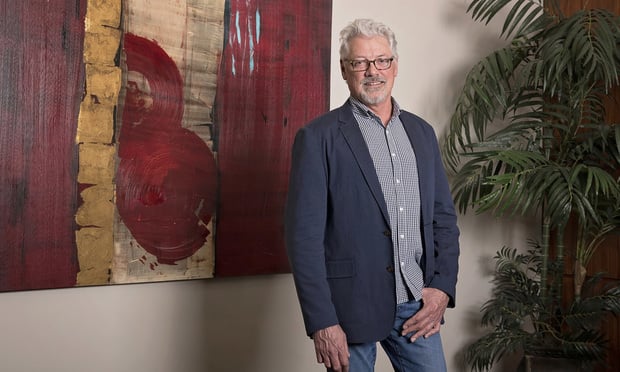Bill Putman Went From Hiding Depression to Telling Others, 'Don't Fear' the Discussion
It's “a feeling a lot of lawyers have ... but you don't want to show that kind of vulnerability. You don't want to show any weakness,” Putman said.
May 12, 2019 at 07:00 PM
7 minute read
The original version of this story was published on Law.com
 Attorney William Putman, of the Putman Law Office in Fayetteville, Arkansas on May 5.
Attorney William Putman, of the Putman Law Office in Fayetteville, Arkansas on May 5.
Bill Putman's resume includes being a law firm partner, in-house counsel, state prosecutor, and now, running his own firm.
It's a career that would make plenty of lawyers jealous. But for many years, he didn't discuss what was taking place behind the scenes: a battle with depression.
 Born and raised in Arkansas, Putman began his career teaching communications at Purdue University before opting to attend law school back in his home state. He landed a clerkship right after graduation in 1991 and then took a job at a local firm.
Born and raised in Arkansas, Putman began his career teaching communications at Purdue University before opting to attend law school back in his home state. He landed a clerkship right after graduation in 1991 and then took a job at a local firm.
It was there that he was first diagnosed with depression.
Putman said he came into the profession with a family history and predisposition for depression. But the work—the sheer volume of it—was certainly a factor.
“I was handling a lot of really complex litigation … looking back on it, it was something I should not have had so much individual responsibility for,” Putman said. But he didn't want his colleagues to know he was overwhelmed.
It's “a feeling a lot of lawyers have … but you don't want to show that kind of vulnerability. You don't want to show any weakness.”
In the fall of 1994 it became too much, he said. He remembers days when he would stare out the window for long stretches, or sneak out of the office to a coffee shop or bookstore, unable to work any more. He called a psychiatrist he already knew and made an appointment.
“It was kind of a classic story. I realized after I got the diagnosis I had episodes throughout my life,” he said.
Getting the right medication was a challenge, Putman said, but he tried out a few and sought help from a therapist, and read “everything I could get my hands on” about depression.
And he continued to work at the firm, then called Mashburn & Taylor, becoming a partner in 1996.
Depression was becoming a bigger part of the national conversation, as new antidepressants entered the market in the late 1980s and early 1990s. But Putman was hesitant to share his experience.
“We weren't at the point in the profession, definitely not at my firm, where it felt like something I could talk to anyone about,” he said.
He raised the issue just once with senior partners at his firm.
“They didn't react negatively, but they didn't really want to hear about it or talk about it,” Putman said. “It never came up again.”
Putman took a job in the state attorney general's office after the senior partner he worked with most left to pursue a judgeship. After a year as a prosecutor, Putman took a job in Walmart's legal department working on class actions and other litigation.
That brought new challenges. On his first day at Walmart, the longtime general counsel who had hired him resigned.
“It was a pretty chaotic time after that,” Putman said. In his three-and-a-half years at the company, he reported to nine different people. Morale was low, he said.
“They were different environments, public service and corporate legal work. But it was not something I felt comfortable talking to anyone about,” Putman said.
There were a few exceptions. While working at the AG's office, he met a lawyer who resigned from the office soon after he arrived, who was also dealing with depression. They became friends and talked about their experiences, feeling unable to confide in their current colleagues.
And there was another lawyer he met in-house who told him about her own depression, and who also became a friend.
“We both felt that it was not something we wanted to share with our colleagues … it would be career-limiting,” Putman said.
His boss at Walmart never specifically discussed mental illness, he said, but often referred to certain choices or characteristics in people as “career-limiting.” And he would refer to “the optics of a situation” in many contexts.
“I thought the optics of being an attorney in that situation, dealing with depression, would not be good,” Putman said.
He left Walmart in 2006 and hung his own shingle for the first time.
“At this point I think of depression as something I manage,” Putman said. But “being a solo, starting a law practice has its stressful times … at that point I was feeling the depression creeping back.”
He wanted to head it off, so he did some research. He found Dan Lukasik's website, Lawyers With Depression, and a book by Richard O'Connor, “Undoing Depression.” Putman reached out to Lukasik, saying he wanted to create a legal community for lawyers with depression, like he had done on his website.
“At that point I was more open about it. It wasn't something I talked to a lot of people about, but it wasn't something I felt like I had to hide,” Putman said.
He kept in touch with Lukasik and became more engaged in educational efforts on mental health in the law. Eventually he was speaking at CLEs and other events about his own experience. He even wrote a piece for Lawyers With Depression, which was published online in 2016, the same year he joined the committee of the Arkansas Judges and Lawyers Assistance Program.
“It was worth the risk that some people might view that as a negative in my career, if I could use my experience to help other people,” Putman said.
Putman returned to his former firm in 2008. By that point he felt like he could talk about depression openly, but he still felt a cultural mismatch with the firm, now called Taylor Law Partners, and he left in 2017.
Going back to solo practice has been “a net positive,” he said, also giving him more flexibility and autonomy over his work.
Looking back, Putman said he would advise younger lawyers to spend some time asking themselves what they want not just from their careers, but out of their lives.
“You get into the field, and you let the field in a way define what counts as success,” he said. “I've had a good career in private practice, public service, corporate law. For a lawyer from Fayetteville, Arkansas, who's not with a Big Law firm, I've had some substantial accomplishments.”
But one of the things he's most proud of is the article he wrote for Lukasik's website.
“I want to be the guy standing in front of a group of lawyers and saying … 'don't fear if you're struggling, that if you acknowledge that you have personal things to deal with that it will negatively affect your career,'” Putman said. “It doesn't have to be that way.”
This story is part of a special report on mental health and the legal profession from Law.com: Minds over Matters.
This content has been archived. It is available through our partners, LexisNexis® and Bloomberg Law.
To view this content, please continue to their sites.
Not a Lexis Subscriber?
Subscribe Now
Not a Bloomberg Law Subscriber?
Subscribe Now
NOT FOR REPRINT
© 2025 ALM Global, LLC, All Rights Reserved. Request academic re-use from www.copyright.com. All other uses, submit a request to [email protected]. For more information visit Asset & Logo Licensing.
You Might Like
View All
White & Case Crosses $4M in PEP, $3B in Revenue in 'Breakthrough Year'
6 minute read
Haynes and Boone Expands in New York With 7-Lawyer Seward & Kissel Fund Finance, Securitization Team
3 minute read
'None of Us Like It': How Expedited Summer Associate Recruiting Affects Law Students and the Firms Hiring Them

Sheppard Mullin, Morgan Lewis and Baker Botts Add Partners in Houston
5 minute readTrending Stories
- 1Paul Hastings’ New Partner Talks Giving Control to Agentic AI, EU AI Act Impacts, and More
- 2Judge Pauses Deadline for Federal Workers to Accept Trump Resignation Offer
- 3DeepSeek Isn’t Yet Impacting Legal Tech Development. But That Could Soon Change.
- 4'Landmark' New York Commission Set to Study Overburdened, Under-Resourced Family Courts
- 5Wave of Commercial Real Estate Refinance Could Drown Property Owners
Who Got The Work
J. Brugh Lower of Gibbons has entered an appearance for industrial equipment supplier Devco Corporation in a pending trademark infringement lawsuit. The suit, accusing the defendant of selling knock-off Graco products, was filed Dec. 18 in New Jersey District Court by Rivkin Radler on behalf of Graco Inc. and Graco Minnesota. The case, assigned to U.S. District Judge Zahid N. Quraishi, is 3:24-cv-11294, Graco Inc. et al v. Devco Corporation.
Who Got The Work
Rebecca Maller-Stein and Kent A. Yalowitz of Arnold & Porter Kaye Scholer have entered their appearances for Hanaco Venture Capital and its executives, Lior Prosor and David Frankel, in a pending securities lawsuit. The action, filed on Dec. 24 in New York Southern District Court by Zell, Aron & Co. on behalf of Goldeneye Advisors, accuses the defendants of negligently and fraudulently managing the plaintiff's $1 million investment. The case, assigned to U.S. District Judge Vernon S. Broderick, is 1:24-cv-09918, Goldeneye Advisors, LLC v. Hanaco Venture Capital, Ltd. et al.
Who Got The Work
Attorneys from A&O Shearman has stepped in as defense counsel for Toronto-Dominion Bank and other defendants in a pending securities class action. The suit, filed Dec. 11 in New York Southern District Court by Bleichmar Fonti & Auld, accuses the defendants of concealing the bank's 'pervasive' deficiencies in regards to its compliance with the Bank Secrecy Act and the quality of its anti-money laundering controls. The case, assigned to U.S. District Judge Arun Subramanian, is 1:24-cv-09445, Gonzalez v. The Toronto-Dominion Bank et al.
Who Got The Work
Crown Castle International, a Pennsylvania company providing shared communications infrastructure, has turned to Luke D. Wolf of Gordon Rees Scully Mansukhani to fend off a pending breach-of-contract lawsuit. The court action, filed Nov. 25 in Michigan Eastern District Court by Hooper Hathaway PC on behalf of The Town Residences LLC, accuses Crown Castle of failing to transfer approximately $30,000 in utility payments from T-Mobile in breach of a roof-top lease and assignment agreement. The case, assigned to U.S. District Judge Susan K. Declercq, is 2:24-cv-13131, The Town Residences LLC v. T-Mobile US, Inc. et al.
Who Got The Work
Wilfred P. Coronato and Daniel M. Schwartz of McCarter & English have stepped in as defense counsel to Electrolux Home Products Inc. in a pending product liability lawsuit. The court action, filed Nov. 26 in New York Eastern District Court by Poulos Lopiccolo PC and Nagel Rice LLP on behalf of David Stern, alleges that the defendant's refrigerators’ drawers and shelving repeatedly break and fall apart within months after purchase. The case, assigned to U.S. District Judge Joan M. Azrack, is 2:24-cv-08204, Stern v. Electrolux Home Products, Inc.
Featured Firms
Law Offices of Gary Martin Hays & Associates, P.C.
(470) 294-1674
Law Offices of Mark E. Salomone
(857) 444-6468
Smith & Hassler
(713) 739-1250










